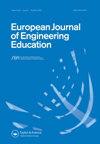Creating effective project-based courses: personal relevance and its relations to successful group work
IF 2.8
Q2 EDUCATION & EDUCATIONAL RESEARCH
引用次数: 0
Abstract
ABSTRACTGroup projects are expected in contemporary engineering curricula, and yet they often pose a challenge to students and instructors alike. Could making projects personally relevant help? The present study created and tested a conceptual framework regarding the impact of personal relevance on groupwork in a project-based learning (PBL) course. We examined how measures of personal relevance (PR), both at the course level (value, interest in specialisation) and specifically regarding projects (interest and investment in the project, and contribution to the project idea) relate to students’ expectancy, group connectedness, team dynamics (effectiveness, conflict, satisfaction, interdependence, and cohesiveness), and perceived effort; whether PR differs based on students’ gender, academic year, or time of the semester; and whether PR predicts students’ project performance. Seventy-one undergraduates in a project-based computer science course at a large public US university completed surveys assessing these constructs at five timepoints during the semester. Our findings suggest PR is related to positive outcomes in PBL courses, with interest and investment predicting an increase in the project grade. Similarly, gender predicted project grade with female students having significantly higher scores overall, above and beyond other measures. We discuss implications for creating project-based courses in higher education engineering courses.KEYWORDS: Personal relevanceproject-based learningmotivationperceived effortgroup connectednessteam dynamics AcknowledgmentsThis research was supported by the Center for Teaching Excellence of the University of Virginia. We thank the students who participated to this research, as well as our colleagues: Lindsay Wheeler for her insightful guidance throughout all stages of this work, Stefen Beeler-Duden for his assistance with data collection, and Xi Wang for her contribution in the literature review of this paper. We also want to acknowledge the significant contribution of Charles Rushton and Stephanie Morton to the preliminary analysis in an earlier version of this work.Disclosure statementNo potential conflict of interest was reported by the author(s).Additional informationNotes on contributorsPanagiotis ApostolellisPanagiotis Apostolellis is a full-time Assistant Professor in the Computer Science Department at the University of Virginia. He received his PhD in Computer Science & Applications from Virginia Tech in 2017. He also holds a MSc in Computer Science from Virginia Tech (VT) and an MSc in Human-Centered Systems from the University of Sussex (UK). His research is focused on understanding the contributing factors to successful project-based engineering courses and improving computer science education. In the past, he worked as a Senior Interactive Designer and Developer at a cultural institution in his home country, Greece (2000–11), which informed his prior research on audience interaction with serious games and virtual environments in informal learning settings.Jessica TaggartJessica Taggart, PhD, is a postdoctoral research associate in the Center for Teaching Excellence at the University of Virginia. Her current research explores effective teaching, learning, and curriculum development practices in higher education. She is especially interested in better understanding how leveraging active and collaborative learning techniques can improve student outcomes.R. X. SchwartzR. X. Schwartz is a student in the Graduate Cybersecurity Management Certificate at the University of Virginia, and a graduate of the UVA Bachelor's in Systems Engineering. He is a researcher in the areas of digital wellbeing and human–computer interaction.创建有效的基于项目的课程:个人相关性及其与成功的小组工作的关系
摘要在当代工程课程中,小组项目是被期待的,然而他们经常对学生和教师提出挑战。制作与个人相关的项目会有帮助吗?本研究在基于项目的学习(PBL)课程中创建并测试了一个关于个人关联对小组工作影响的概念框架。我们研究了个人相关性(PR)的衡量标准,无论是在课程层面(价值,对专业的兴趣),还是在项目方面(对项目的兴趣和投资,以及对项目理念的贡献),与学生的期望、团队联系、团队动态(有效性、冲突、满意度、相互依存和凝聚力)和感知努力之间的关系;PR是否因学生性别、学年或学期时间的不同而不同;以及公关是否能预测学生的项目表现。在美国一所大型公立大学的基于项目的计算机科学课程中,71名本科生在本学期的五个时间点完成了对这些结构的调查。我们的研究结果表明,PR与PBL课程的积极结果有关,兴趣和投资预示着项目成绩的提高。同样,性别预测项目成绩,女学生总体得分明显更高,高于其他指标。我们讨论了在高等教育工程课程中创建基于项目的课程的意义。关键词:个人关联、项目式学习动机、感知努力、群体联系、蒸汽动力学。我们还要感谢查尔斯·拉什顿(Charles Rushton)和斯蒂芬妮·莫顿(Stephanie Morton)对这项工作早期版本的初步分析做出的重大贡献。披露声明作者未报告潜在的利益冲突。关于贡献者的其他信息panagiotis Apostolellis panagiotis Apostolellis是弗吉尼亚大学计算机科学系的全职助理教授。他于2017年获得弗吉尼亚理工大学计算机科学与应用博士学位。他还拥有Virginia Tech (VT)的计算机科学硕士学位和University of Sussex (UK)的Human-Centered Systems硕士学位。他的研究重点是了解成功的基于项目的工程课程和改进计算机科学教育的因素。在过去,他曾在他的祖国希腊的一家文化机构担任高级交互设计师和开发人员(2000 - 2011),这为他之前关于在非正式学习环境中严肃游戏和虚拟环境中的受众互动的研究提供了基础。Jessica Taggart,博士,是弗吉尼亚大学卓越教学中心的博士后研究员。她目前的研究是探索高等教育中有效的教学、学习和课程开发实践。她特别感兴趣的是更好地理解如何利用主动和协作的学习技巧来提高学生的成绩。x SchwartzR。X. Schwartz是the University of Virginia的研究生网络安全管理证书的学生,也是UVA系统工程学士学位的毕业生。他是数字健康和人机交互领域的研究人员。
本文章由计算机程序翻译,如有差异,请以英文原文为准。
求助全文
约1分钟内获得全文
求助全文
来源期刊

European Journal of Engineering Education
EDUCATION & EDUCATIONAL RESEARCH-
CiteScore
7.30
自引率
13.00%
发文量
64
期刊介绍:
European Journal of Engineering Education is published six times a year in print and electronic editions and provides an essential forum for dialogue between researchers and specialists in the field of engineering education, at European and worldwide levels. European Journal of Engineering Education is the Official Journal of SEFI, the Socièté Européenne pour la Formation des Ingénieurs (the European Society for Engineering Education). SEFI is a non-governmental organization whose aims are to develop information about engineering education, to improve communication and exchange between professors, researchers and students and to promote cooperation between the various institutions concerned with engineering education.
 求助内容:
求助内容: 应助结果提醒方式:
应助结果提醒方式:


